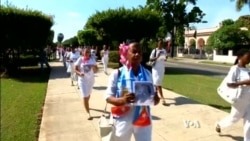President Barack Obama is expected to discuss human rights with Cuban leader Raul Castro when, for the first time, both the U.S. and Cuban presidents attend the Summit of the Americas.
U.S. Assistant Secretary of State Roberta Jacobson said there would be "interaction" between the two leaders during the summit in Panama April 10-11. But she did not specify the circumstances of their meeting.
The U.S. diplomat said Obama has made clear the U.S. does not believe the human rights situation in Cuba is "adequate," and added that the U.S. would not change its "willingness to speak out on human rights violations simply because we are now engaging with the Cuban government directly."
In December, the White House announced a historic shift in its policy toward Cuba, moving away from 50 years of isolation to a policy of engagement meant to empower the Cuban people.
During the summit, Obama is expected to meet with members of Cuba's civil society who will be attending. Jacobson said the U.S. leader would send a clear message that "in places where either political or civil space has closed in recent years or remains closed, such as in Cuba, we give support to those who continue to peacefully fight for the space to be open."
Eyes on Havana
With the U.S. and Cuba working to restore diplomatic ties, groups like Amnesty International are closely watching Havana’s handling of dissent and freedom of assembly, association and expression.
In December, the same month Cuba released 53 activists from prison, the communist government also arrested dozens of other demonstrators and dissidents, and it even rearrested some activists it had just released.
"We have been seeing that some prisoners of conscience or dissidents have been put back in jail. Some other dissidents have been harassed," said Marshelha Goncalves Margerin, Amnesty International advocacy director.
While diplomats in the U.S. and Cuba are working to reopen embassies in Havana and Washington, they also have started laying the groundwork for human rights talks.
Those talks will face challenges rooted in fundamentally different philosophies on human rights, according to Brookings Institution analyst Ted Piccone.
“The Cubans will emphasize that, 'This is our own domestic sovereign affairs and you shouldn’t be poking your nose into our human rights issues,' " said Piccone, "and the Americans will say, 'No, these are universal norms that all states have agreed to adhere to, and that includes Cuba.' ”
Comparison of records
During human rights talks, the U.S. agenda most likely will focus on Cuba’s political and civil rights record, while Cuba most likely will criticize U.S. social services as inadequate and point to events in Ferguson, Missouri, as an example of civil rights problems in the U.S. The city became a flashpoint for a national debate on the state of race relations in America after a police officer, who has been cleared of wrongdoing, fatally shot an unarmed African-American teenager during a street confrontation last August.
U.S. diplomats will be ready to take on such issues with Cuban officials, Piccone said.
“We have court systems, we have accountability boards, we have auditing systems," he said. "We have a free media and a press, we have a very strong Congress. These are ways we have checks and balances in our system to address the underlying human rights problems, and in the Cuban case, they don’t."
However, critics of U.S. policy toward Cuba say Havana has no intention of allowing dissent or basic freedoms. Others believe that as more Cubans are exposed to the rest of the world, they will bring pressure on the Cuban government and force change on the communist nation.





